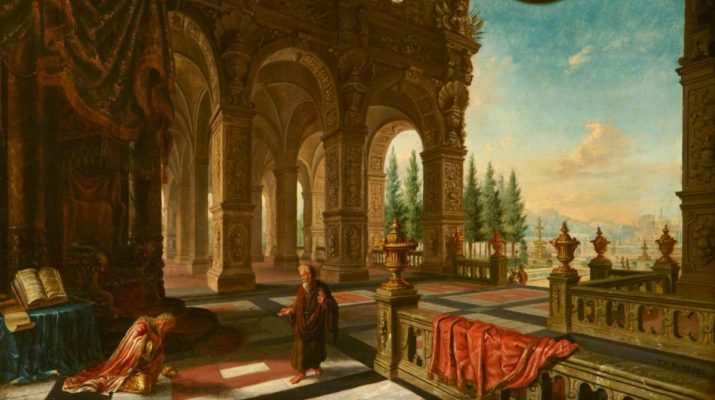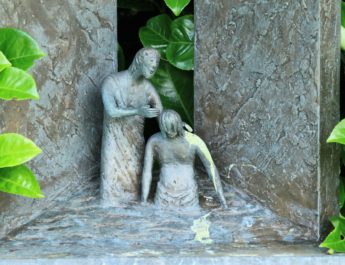2 Samuel 7:1-14a
Ordinary B34
BibleHub
1 NowA when the kingB was settledC in his house,D
Notes on verse 1a
A {untranslated} = hayah. This is to be or become, to happen.
B “king” = melek. From malak (to be or become king or queen, to rise to the throne, to be crowned; by implication, to take counsel). This is king or royal.
C “settled” = yashab. This is to sit and so to remain and so to dwell. It is sitting for any reason – as a judge, in order to ambush, or just sitting quietly. Causatively, this can mean settling or marrying. This can also mean continue, endure, or establish.
D “house” = bayit. Probably from banah (to build, make, set up, obtain children; to build literally or figuratively). This is house, court, family, palace, temple.
and the LordE had given him restF from all his enemiesG aroundH him,
Notes on verse 1b
E “Lord” = YHVH. Related to {untranslated} in v1. From havah (to be, become) or hayah (see note A above). This is the name of the God of Israel, the self-existent and eternal one, the tetragrammaton. This pronunciation has been lost to time so “Lord” is generally used in its place.
F “given…rest” = nuach. This is to rest, calm, camp, free, place, remain, satisfy, settle, station, or wait. It is rest and so implies settling down in a literal or figurative sense. This is perhaps the root verb of the name “Noah.”
G “enemies” = oyeb. From ayab (to hate or be hostile to). This is a foe or enemy as one that you are hostile to.
H “around” = sabib. From sabab (turning around, going around; to surround, cast, walk, fetch; to revolve or border in a literal or figurative sense). This is a circuit or a circle. It could refer to an environment, one’s neighbors, or a circular path round about.
2 the king said to the prophetI Nathan,J “SeeK now,L I am livingM in a house of cedar,N
Notes on verse 2a
I “prophet” = nabi. This is prophet, prophecy, speaker, or someone inspired.
J “Nathan” = Natan. From natan (to give, put, set, offer; to give literally or figuratively). This is Nathan, meaning “given” or “[God] gives.”
K “see” = raah. This is to see in a literal or figurative sense so stare, advise, think, view.
L “now” = na. This particle is used for requests or for urging. It can be we pray, now, I ask you, oh. This is the same “na” in “hosanna.”
M “living” = yashab. Same as “settled” in v1. See note C above.
N “cedar” = erez. Perhaps from araz (made from cedar; to be firm, strong). This is cedar or a cedar tree as strong.
but the arkO of GodP staysQ inR a tent.”S
Notes on verse 2b
O “ark” = aron. Perhaps from arah (to gather or pluck). This is a chest, box, or coffin. It is used for the Ark of the Covenant.
P “God” = Elohim.
Q “stays” = yashab. Same as “settled” in v1. See note C above.
R “in” = tavek. This is among, middle, in the midst, the center. Perhaps, properly, to sever.
S “tent” = yeriah. From yara (to tremble, fear, quiver). This is a hanging curtain – a tent curtain that can shake.
3 Nathan said to the king, “Go,T doU all that you have in mind;V for the Lord is with you.”
Notes on verse 3
T “go” = halak. This is go, come, walk. It is walk literally and figuratively and includes people and animals. It can be used figuratively for one’s moral life – how we walk according to God’s way or against it. It can also refer to the walk of life as in the course one’s life takes, the choices we make, etc.
U “do” = asah. This is to make, do, act, appoint, become in many senses.
V “mind” = lebab. May be related to labab (to encourage; properly, to be encased as with fat; used in a good sense, this means to transport someone with love; used in a bad sense, it can mean to dull one’s senses). This is the heart, courage, one’s inner self, the mind, or the will. Heart is only used in a figurative sense in the Old and New Testaments.
4 ButW that same nightX the wordY of the Lord cameZ to Nathan:
Notes on verse 4
W {untranslated} = hayah. Same as {untranslated} in v1. See note A above.
X “night” = layil. Properly, this refers to light twisting away. It is used for night or midnight. Figuratively, this can mean adversity.
Y “word” = dabar. From dabar (to speak, declare, discuss). This is speech, a word, a matter, an affair, charge, command, message, promise, purpose, report, request. It is a word, which implies things that are spoken of in a wide sense.
Z “came” = hayah. Same as {untranslated} in v1. See note A above.
5 Go and tell my servantAA David:BB Thus says the Lord: Are you the one to buildCC me a house to live in?
Notes on verse 5
AA “servant” = ebed. From abad (to work, serve, compel; any kind of work; used causatively, can mean to enslave or keep in bondage). This is a servant, slave, or bondservant.
BB “David” = David. From the same as dod (beloved, love, uncle); the root may mean to boil, which is used figuratively to describe love. So, this implies someone you love such as a friend, a lover, or a close family member like an uncle. David’s name likely means something like “beloved one.”
CC “build” = banah. Related to “house” in v1. See note D above.
6 I have not lived in a house since the dayDD I brought upEE the peopleFF of IsraelGG from EgyptHH to this day,
Notes on verse 6a
DD “day” = yom. Root may mean being hot. This is the day in a literal or figurative sense. It can also mean birth, age, daylight, continually or other references to time.
EE “brought up” = alah. This is to go up, approach, ascend, be high, be a priority; to arise in a literal or figurative sense.
FF “people” = ben. Literally “children.” Related to “house” in v1 & “build” in v5. From banah (see note D above). This is son, age, child. It is son in a literal or figurative sense.
GG “Israel” = Yisrael. Related to “God” in v2. From sarah (to persist, exert oneself, contend, persevere, wrestle, prevail) + el (see note P above). This is Israel, meaning God strives or one who strives with God; new name for Jacob and for his offspring. This refers to the people and to the land.
HH “Egypt” = Mitsrayim. Perhaps from matsor (besieged or fortified place, bulwark, entrenchment; something hemmed in; a siege or distress or fastness); from tsur (to confine, besiege, to cramp). This is Egypt.
but I have beenII moving aboutJJ in a tentKK and a tabernacle.LL
Notes on verse 6b
II “been” = hayah. Same as {untranslated} in v1. See note A above.
JJ “moving about” = halak. Same as “go” in v3. See note T above.
KK “tent” = ohel. Perhaps from ahal (to shine, be clear). This is a tent, covering, home, or side pillar.
LL “tabernacle” = mishkan. From shakan (to settle down in the sense of residing somewhere or staying there permanently; to abide or continue). This is a place where one lives – a tabernacle, tent, or other kind of dwelling. It can also be a lair where animals live, the grave, the Temple, or the Tabernacle.
7 Wherever I have moved about among all the people of Israel, did I ever speakMM a word with anyNN of the tribal leadersOO of Israel, whom I commandedPP to shepherdQQ my peopleRR Israel, saying, “Why have you not built me a house of cedar?”
Notes on verse 7
MM “speak” = dabar. Related to “word” in v4. See note Y above.
NN “any” = echad. Perhaps from achad (to unify, continue on a path; figuratively, to gather one’s thoughts). This is the number one, first, united. It can also be alone, altogether, a certain, a few.
OO “tribal leaders” = shebet. This is a rod, staff, club, scepter, dart, or tribe. Literally a stick that can be used for punishing, writing, fighting, walking, ruling; thus, used figuratively for a clan.
PP “commanded” = tsavah. This is to charge, command, order, appoint, or enjoin. This is the root that the Hebrew word for “commandment” comes from (mitsvah).
QQ “shepherd” = ra’ah. This is to tend a flock, pasture, or graze. It can mean to rule or to associate with someone. Figuratively, it can be ruler or teacher.
RR “people” = am. From amam (to darken, hide, associate; creating shadows by huddling together). This is people or nation. It can be used specifically for a tribe, collectively of troops or armies, or figuratively to refer to a flock of animals.
8 Now therefore thus you shall say to my servant David: Thus says the Lord of hosts:SS I tookTT you from the pasture,UU from following the sheepVV to be princeWW over my peopleXX Israel;
Notes on verse 8
SS “hosts” = tsaba. From tsaba (to wage war, serve, assemble, fight, perform, muster, wait on). This is a large group of persons (used figuratively for a group of things). It implies a campaign literally as with army, war, warfare, battle, company, soldiers. Can also be used figuratively for hardship or for worship.
TT “took” = laqach. This is to take, accept, carry away, receive. It can also have the sense of take a wife or take in marriage.
UU “pasture” = naveh. From navah (home, beautify, praise) This is home, place where shepherd or sheep live. It is at home – implies a lovely place or a place of satisfaction. It can also be used for the Temple or a pasture as the home of wild animals.
VV “sheep” = tson. This is a flock of sheep and goats.
WW “prince” = nagid. From nagad (this is to declare, make conspicuous, stand in front, manifest, predict, explain). This is a commander or leader as the one who stands at the front, whether in a military, religious, or civic setting. It can also mean honorable or noble in an abstract sense.
XX “people” = am. Same as “people” in v7. See note RR above.
9 and I have been with you wherever you went, and have cut offYY all your enemies from beforeZZ you; and I will makeAAA for you a greatBBB name,CCC like the name of the great ones of the earth.DDD
Notes on verse 9
YY “cut off” = karat. This is to cut down, cut off, or make a covenant (idiom for making a covenant is “to cut a covenant”). It can also mean to destroy, fail, or consume.
ZZ “before” = paneh. Literally “from your face.” From panah (to turn, face, appear). This is face in a literal or figurative sense. It could be face, presence, anger, respect. It can also be used of God to indicate divine favor or presence.
AAA “make” = asah. Same as “do” in v3. See note U above.
BBB “great” = gadol. From gadal (to grow up, become great, become wealthy – to advance. The root meaning may be to twist in the sense of the process of growing). This is great, high, bigger, noble, old, marvelous. It can also refer to someone who is powerful or distinguished.
CCC “name” = shem. May be from sum (to put, place, set). This is name, fame, renown. A name was thought to indicate something essential about a person – something about their individuality. So, this word can also mean honor, authority, or character.
DDD “earth” = erets. Root may mean to be firm. This is earth, ground, field land, or country.
10 And I will appointEEE a placeFFF for my peopleGGG Israel and will plantHHH them,
Notes on verse 10a
EEE “appoint” = sum. Related to “name” in v9. See note CCC above.
FFF “place” = maqom. From qum(to arise, stand, accomplish, establish, abide; rising against, getting up after being sick or asleep, arising from one state to another, becoming powerful, or rising for action; standing in a figurative sense). This is a standing, which is to say a spot or space a place. It can also refer to a locality or a physical/mental condition. HaMaqom is also a Jewish name for God – the place, i.e. the Omnipresent One.
GGG “people” = am. Same as “people” in v7. See note RR above.
HHH “plant” = nata. To fix or fasten, establish or plant. This is planting in a literal or figurative sense.
so that they may liveIII in their own place, and be disturbedJJJ no more;KKK and evildoersLLL shall afflictMMM them no more, as formerly,NNN
Notes on verse 10b
III “live” = shakan. Related to “tabernacle” in v6. See note LL above.
JJJ “be disturbed” = ragaz. This is shaking from any strong emotion, particularly anger or fear. It can be agitated, excited, perturbed, afraid, quaking, quivering.
KKK “more” = yasaph. This is to add, increase, continue, exceed.
LLL “evildoers” = ben + evel. Literally “children of wickedness.” Ben is the same as “people” in v6. See note FF above. Evel is perhaps from aval (to deal unjustly, act in a wrongful way, a wrongdoer). This is injustice, wrong, moral evil, acts of violence, or unrighteousness.
MMM “afflict” = anah. This is to be bowed down. It can refer to a sense of humility or to a sense of being browbeaten, oppressed, afflicted, or depressed. This can be literal or figurative – depressed in mood or circumstance.
NNN “formerly” = rishon. From rishah (beginning or early time); from rosh (head, captain, or chief; excellent or the forefront; first in position or in statue or in time). This is first, former, ancestor, beginning, ranked first.
11 from the timeOOO that I appointedPPP judgesQQQ over my peopleRRR Israel; and I will give you rest from all your enemies. Moreover the Lord declaresSSS to you that the Lord will make you a house.
Notes on verse 11
OOO “time” = yom. Same as “day” in v6. See note DD above.
PPP “appointed” = tsavah. Same as “commanded” in v7. See note PP above.
QQQ “judges” = shaphat. This is to judge, defend, pronounce judgment, condemn, or govern. It can refer to God judging or to human judges. This is pronouncing a verdict in favor or against so it implies consequences or punishment. It can also mean to litigate or govern as one with authority.
RRR “people” = am. Same as “people” in v7. See note RR above.
SSS “declares” = nagad. Related to “prince” in v8. See note WW above.
12 When your days are fulfilledTTT and you lie downUUU with your ancestors,VVV I will raise upWWW your offspringXXX after you,
Notes on verse 12a
TTT “fulfilled” = male. This is fill, satisfy, replenish, accomplish, fulfill, confirm, or consecrate. It is fill in a literal or figurative sense.
UUU “lie down” = shakab. This is to lie down, lodge. It is lying for sleep, sex, or other reasons.
VVV “ancestors” = ab. This is father, chief, or ancestor. It is father in a literal or figurative sense.
WWW “raise up” = qum. Related to “place” in v10. See note FFF above.
XXX “offspring” = zera. From zara (to sow or scatter seed; conceive or yield). This is seed or sowing. It can, thus, mean a fruit, plant, sowing time, child, offspring, or posterity.
who shall come forthYYY from your body,ZZZ and I will establishAAAA his kingdom.BBBB
Notes on verse 12b
YYY “come forth” = yatsa. This is to go or come out, bring forth, appear. It is to go out in a literal or figurative sense.
ZZZ “body” = meeh. This is inward parts, belly, heart, womb, intestines, vastness. It can also be figurative for sympathy.
AAAA “establish” = kun. Properly, this means in a perpendicular position. So, it is set up in a literal sense – establish, fix, fasten, prepare. In a figurative sense, it is certainty, to be firm, faithfulness, render sure or prosperous.
BBBB “kingdom” = mamlakah. Related to “king” in v1. From the same as melek (see note B above). This is kingdom, dominion, sovereignty, rule. It can also refer to the realm.
13 He shall build a house for my name, and I will establish the throneCCCC of his kingdom forever.DDDD 14 I will be a fatherEEEE to him, and he shall be a sonFFFF to me.
Notes on verses 13-14a
CCCC “throne” = kisse. From the same as kese (full moon); perhaps from kasah (to cover, conceal, overwhelm; to cover as clothes do or to hide a secret). This is throne – a seat that is covered or has a canopy. Thus, it is a seat that conveys authority.
DDDD “forever” = olam. This is a long scope of time whether in the past (antiquity, ancient time) or in the future (eternal, everlasting).
EEEE “father” = ab. Same as “ancestors” in v12. See note VVV above.
FFFF “son” = ben. Same as “children” in v6. See note FF above.
When he commits iniquity,GGGG I will punishHHHH him with a rodIIII such as mortalsJJJJ use, with blowsKKKK inflicted by human beings.LLLL
Notes on verse 14b
GGGG “commits iniquity” = avah. 17x in OT. This is to bend, turn, be crooked in a literal or figurative sense. So, it can refer to committing iniquity.
HHHH “punish” = yakach. This is to decide, be right, argue, or convince. It can also be to decide, convict, reason together, or reprove.
IIII “rod” = shebet. Same as “tribal leaders” in v7. See note OO above.
JJJJ “mortals” = ish. Perhaps from enosh (human, humankind, mortal); from anash (to be weak, sick, or frail). This is man, husband, another, or humankind.
KKKK “blows” = nega. From naga (touch, reach, arrive, come near, strike; touching for any reason including sexual or violent). This is a blow or stroke, wound, sore, mark plague. It can refer to someone with leprosy or to dress.
LLLL “human beings” = ben + adam. Literally “children of humanity.” Ben is the same as “people” in v6. See note FF above. Adam is perhaps from adam (to be red, make ruddy); related to adamah (ground, dirt, earth). This is man, humankind, also Adam’s name. It refers to a human individual or humanity.
Image credit: “David kneeling in his Palace before the Prophet Nathan” by Tobias van Nijmegen, between 1670 and 1699.




